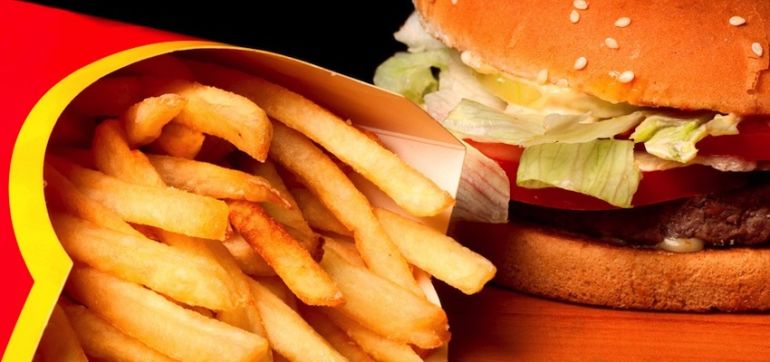7 Downsides To My 125-Pound Weight Loss

I’m guilty of always talking about how awesome it is to have maintained my 125-pound weight loss over the last six years and all of the benefits that come with it. However, everything has its good and bad side (depending on how you look at it). And weight loss is no exception.
For everyone that’s plus-sized and wants to drop some weight, or anyone that was once plus-sized, this is for you. These are some examples of situations you may have to live with once you sustain your weight loss over the years. Here are seven downsides to keeping weight off long-term:
1. You're a constant example to the people around you.
This can create unnecessary pressure on just living a normal life. Whether it’s on our mind or not, people are keeping tabs on what we do. According to statistics, only 5% of all Americans who lose weight will keep it off for over five years. The rest of us gain it all back, plus some.
So when we’re in that five percent, people become curious and make judgments about what we do for exercise and what we stick in our mouths. Though no one enjoys being the source of constant judgement or questioning, this "downside" can also serve as an inspiration to others. Just by being our healthier selves, we can do good for those around us.
2. Your relationships change drastically.
Just like individuals going through addiction recovery or even new mothers, we'll find many of our old friends drift away. We all have friends in our lives that were fun to hang out with, but ultimately were bad influences to the new life we're trying to create for ourselves.
Many people tell me the biggest problem with sustained weight loss is the judgment from others. Some friends drift on their own out of self-imposed guilt for choosing to remain unhealthy, while sometimes we decide to limit the amount of time we spend with these people on our own. Though it's sad to lose friends, it can also be a good thing as our inner circle opens up to include new people who hold the same values we do about a healthier lifestyle.
3. Friends will only talk to you about health-related topics.
A few people I know who've lost a lot of weight and kept it off have mentioned this phenomenon to me, and I’ve noticed it myself. If we have friends we don't see very frequently, the topic of discussion when we do get together always seems to come back to anything related to health, usually their own routines.
It’s a curious thing: our friends seem to feel the need to talk about all of the healthy steps they're taking in their lives as if we're judging them or are now acting as their personal health coach.
4. Visible changes stop.
It’s less difficult for many of us to stay motivated during weight loss because we may see the number on the scale moving or the fact that our clothes fit better. But after a while, the progress isn't visibly evident anymore. Even if we're working toward becoming more toned and athletic, we often plateau.
At this point, we have to be honestly happy with what we see in the mirror and work toward improving ourselves in ways that aren't so obvious to the eye. Doing inner work is just as important — if not more so — as focusing on appearances. Without working on the psychological aspect of who we are, our weight loss may not be permanent.
5. The kind of attention you're used to getting changes.
If you’re like me and you were accustom to people shouting hurtful names at you from passing cars or rolling their eyes when you took your third trip through the buffet line, that kind of stuff usually stops after drastic weight loss. However, if we get to a weight that feels good, we may start receiving another kind of unwanted, unwelcome attention in the form of catcalls we may have never heard before.
6. Junk food becomes a rare indulgence.
If we want to maintain our weight loss, we can't eat the same kind of food we once did: While our friends are enjoying their plates of nachos, we have a salad.
However, sustained weight loss isn’t all about restriction. Restriction often leads to disordered eating and no one wants that. So, sometimes, it can be a dance between eating clean most of the time and indulging once in awhile. Moderation is achievable with the right mindset, but it takes a lot of work. This can be a good thing because when we do eat junk food, we may treat it as a luxury and enjoy it more, instead of just shoving it in our mouths without even tasting it.
7. You'll constantly be answering questions.
If you ever mention that you once weighed 300 pounds, you'll always have to answer the question, "How did you lost the weight?" We have be prepared to craft a quick, easy response to this question, maybe for the rest of our lives. No one asks about what we do right now to maintain the weight loss — they only want to know how we lost it.
Sure, it may be annoying to tell your story over and over, but a better way to approach it is as a teaching moment. If your story can inspire or help someone else, why not share? Perceive it as less of an annoyance, and more of a service.
Have you noticed any of these situations on your weight loss journey or do you have some examples of your own that are “downsides” to long-term weight loss?
Photo courtesy of the author
-
Weight Loss Myths Debunked
Myth: I can use a quickie diet or pill to lose weight and keep it off.
-
The Knowledge And Wisdom Of Water
There is no question that water is vital to us as it is an essential c
-
How to Lose Middle-Age Weight Gain
Weight increase in middle-age is very common but it is not inevita
-
Top Ten Tips For Weight Loss That You Wont Get From a Fitness Guru
A healthy lifestyle is a holistic proces
-
Why You Shouldnt Diet In The New Year
I realize that the New Years diet resolution is as predictable a
-
Lose Weight - 5 Tips For Healthy Weight Loss
It doesnt have to be a struggle! Sure, there will be a sacrifice, b
- DON'T MISS
- Calorie Counters and Weight Loss Exercise
- Advanced Weight Loss - Does Detoxification Really Work?
- LisaRaye: Fit, Fine & 40+
- Great Advice To Help You Lose Weight And Keep It Off
- Reasons Why Natural Weight Loss Is Better Than Taking Weight Loss Supplements
- Jenny Craig Vs. Weight Watchers
- Weight loss Programs: Will They Actually Work?
- The Staggering Secret Of Slow Weight Loss
- Struggling To Lose Weight? Are You Addressing The Biggest Culprit?
- Weight Loss Pills ?Useful but are Not Magic Bullets all by Themselves




